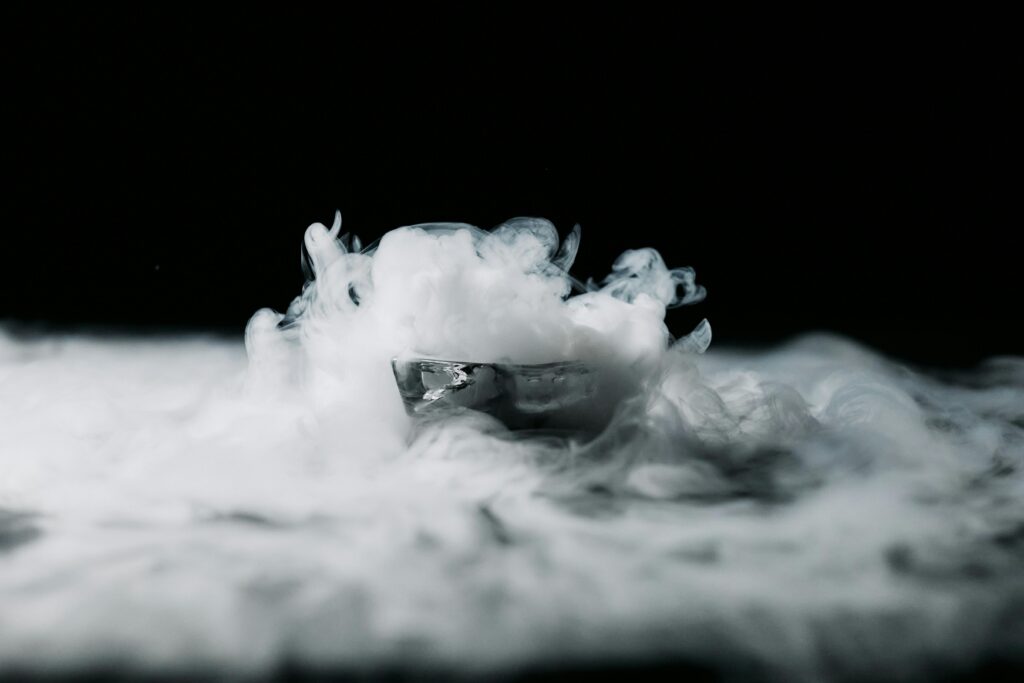One hot day, 🌞 I decided to order online ice cream. 🍦 After ordering it online, I was surprised to find alongside the tub of ice cream, a white substance that didn’t behave like regular ice—it didn’t melt. Intrigued, I touched it and felt its chilling coldness. It turned out to be dry ice! Curious to learn more, I decided to experiment by pouring it into a bowl of water, and to my amazement, a thick cloud of smoke billowed out, leaving me mystified. 💨
This encounter with a substance I had only heard of but never experienced firsthand, was fascinating. It made me reflect on recent news where five people fell ill after inadvertently consuming dry ice mixed with mouth fresheners. Furthermore, I was intrigued by an incident in the USA where a woman died due to exposure to dry ice fumes. 😮
Motivated by these incidents, let’s explore it further, delving into its properties, uses, production methods, and safety considerations.
How it Differs from Regular Ice:
Dry ice, a captivating substance, boasts unique properties that set it apart from regular ice:
- Frozen Carbon Dioxide: Dry ice is solid carbon dioxide (CO₂) formed by super-cooling CO₂ gas without transitioning into a liquid state. It lacks color, odor, and flammability.
- Bubbly Fog: When it interacts with water, it produces a bubbly fog due to the formation of carbonic acid, altering the water’s pH.
- No Messy Melting: Unlike traditional ice, dry ice sublimates directly into gas without melting into a liquid, leaving behind no mess. This makes it ideal for keeping things cold without moisture.
- Versatile Uses: From preserving perishables during camping trips to creating eerie fog in haunted houses.
How it is Manufactured:
The production of dry ice involves a series of steps known as “carbon dioxide capture and cooling”:
- Carbon Dioxide Collection: CO₂ is collected from various sources, including industrial processes or the atmosphere.
- Compression: The collected CO₂ is compressed to convert it into a liquid state.
- Cooling and Pressure Reduction: The liquid CO₂ undergoes rapid cooling and depressurization, causing it to solidify into dry ice.
- Shaping and Packaging: The solid dry ice is shaped into pellets or blocks, packaged, and insulated to prevent excessive sublimation.
- Distribution: Packaged dry ice is distributed for various applications such as refrigeration, shipping, and special effects.
Unique Qualities:
Dry ice exhibits several exceptional qualities:
- Extreme Coldness: With an incredibly low sublimation point, it effectively maintains freezing temperatures without transitioning into a liquid state.
- Sublimation Phenomenon: When exposed to room temperature, it produces a dense fog-like vapor, making it ideal for creating dramatic effects.
- Residue-Free Sublimation: It sublimates cleanly without leaving any liquid residue, making it advantageous for maintaining cleanliness.
- Safety Precautions: While generally safe when handled correctly, direct skin contact can cause frostbite, and excessive sublimation in poorly ventilated spaces can pose safety risks.
Applications of Dry Ice:
Dry ice serves a myriad of purposes:
- Temporary Cooling: Used for temporary cooling in situations where traditional refrigeration methods are unavailable.
- Special Effects: Dry ice’s sublimation creates mesmerizing fog, enhancing the ambiance of events and productions.
- Preserving Perishables: Ensures perishable goods remain fresh during shipping by maintaining stable temperatures.
- Carbonation: Adds carbonation to beverages, making them bubbly and refreshing.
- Cleaning: Delicately removes grime without causing damage, perfect for various industries.
- Preservation: Safeguards biological samples and sensitive materials during transit, ensuring their integrity remains intact.
Safety Considerations and Environmental Impact:
Consuming is hazardous due to its extreme coldness and potential for gas expansion in the body. Similarly, exposure to dry ice in confined spaces can lead to a decrease in oxygen levels, posing breathing difficulties and dizziness.
Using it can impact the environment through greenhouse gas emissions, energy intensity in manufacturing, waste generation, and air quality concerns. Therefore, adopting sustainable practices is crucial to mitigate these environmental impacts.
Final Note
In case if you wish to read, https://adhunikcharcha.com/benefits-of-sudarshan-kriya-yoga/

